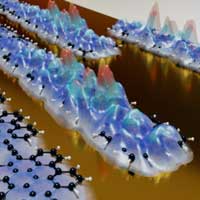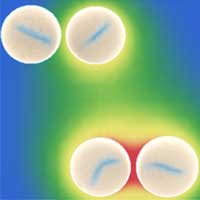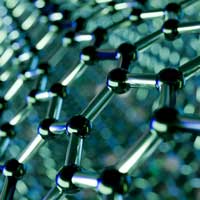 Disabling a gene in specific mouse cells, researchers have prevented mice from becoming obese, even after the animals had been fed a high-fat diet.
Disabling a gene in specific mouse cells, researchers have prevented mice from becoming obese, even after the animals had been fed a high-fat diet.
Tuesday, May 5, 2020
Gene-disabling nanoparticles prevent obesity in mice
 Disabling a gene in specific mouse cells, researchers have prevented mice from becoming obese, even after the animals had been fed a high-fat diet.
Disabling a gene in specific mouse cells, researchers have prevented mice from becoming obese, even after the animals had been fed a high-fat diet.
Nanoparticles break down explosives in wastewater
 An activated carbon filter can purify your drinking water, but it's no match for wastewater that contains military-grade explosives. To clean wastewater from munitions processing and demilitarization, engineers are testing a novel technology using iron nanoparticles.
An activated carbon filter can purify your drinking water, but it's no match for wastewater that contains military-grade explosives. To clean wastewater from munitions processing and demilitarization, engineers are testing a novel technology using iron nanoparticles.
Scientists take steps to create a 'racetrack memory', potentially enhancing digital data storage
 'Racetrack memory', which reconfigures magnetic fields in innovative ways, could supplant current methods of mass data storage, such as flash memory and disk drives, due to its improved density of information storage, faster operation, and lower energy use.
'Racetrack memory', which reconfigures magnetic fields in innovative ways, could supplant current methods of mass data storage, such as flash memory and disk drives, due to its improved density of information storage, faster operation, and lower energy use.
Towards metallic polymers by exploiting two faces of the same coin: topological order and pi-conjugation
 Researchers present a new strategy to fabricate quasi-metallic 1D polymers with atomic precision. These findings advance the possibility to design stable organic polymers with vanishing electronic bandgaps, whose applications range from molecular optoelectronics to quantum information technology.
Researchers present a new strategy to fabricate quasi-metallic 1D polymers with atomic precision. These findings advance the possibility to design stable organic polymers with vanishing electronic bandgaps, whose applications range from molecular optoelectronics to quantum information technology.
An artificial 'tongue' of gold to taste maple syrup
 It's said that maple syrup is Quebec's liquid gold. Now scientists have found a way to use real gold -- in the form of nanoparticles -- to quickly find out how the syrup tastes.
It's said that maple syrup is Quebec's liquid gold. Now scientists have found a way to use real gold -- in the form of nanoparticles -- to quickly find out how the syrup tastes.
Drops of nanoparticles self-stir and communicate
 Researchers have discovered a new mechanism of self-organization of active matter. When photochemically active nanoparticles are enclosed at high density within a drop and are exposed to UV light, a self-organized flow pattern emerges by spontaneous symmetry breaking. Furthermore, each drop communicates with neighbouring drops by exchanging chemicals, and coordination of their internal flows occurs - even when far apart.
Researchers have discovered a new mechanism of self-organization of active matter. When photochemically active nanoparticles are enclosed at high density within a drop and are exposed to UV light, a self-organized flow pattern emerges by spontaneous symmetry breaking. Furthermore, each drop communicates with neighbouring drops by exchanging chemicals, and coordination of their internal flows occurs - even when far apart.
Hydrogen and nanomaterials may transform energy industry
 Scientists argue that hydrogen, used as a zero-carbon energy carrier, has the potential to significantly transform the global energy landscape.
Scientists argue that hydrogen, used as a zero-carbon energy carrier, has the potential to significantly transform the global energy landscape.
Subscribe to:
Comments (Atom)
